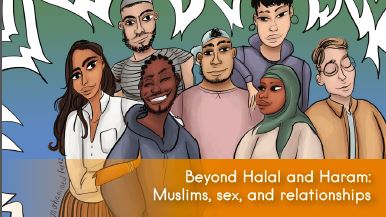Healthy Relationships and Consent: Muslim Youth and Safety

When I was in third grade, my best friend – who was in fifth grade – came running home after school, pulling me into my room, shutting the door, and exclaiming out of breath, “You will NOT believe what I learned today.”
And then, complete with diagrams of x’s and y’s, my friend told me all about her sex education class.
I listened intently, not interrupting her a single time. When she was finally done, she looked up and said, “So? What do you think? Can you believe it?”
Very calmly, I looked right back at her and very confidently said, “Well, that’s nice, but I just want you to know, Muslims don’t do that. So I really don’t know what you just learned.”
She looked right back at me with the same confidence and said, “They do. I asked my teacher.”
And that, friends, is how I came to know about the birds and the bees.
An Early Confidant
My mother was proactive enough to send me to sex education classes at every grade they offered them. Yet, I paid attention only to pass the exams. After all, I told myself that I was a Muslim and that stuff didn’t apply to me – I would wait until I was married and so would my future spouse.
What I didn’t know is that I would quickly become a confidant and resource for all my friends, who were beginning to navigate dating, relationships, and sex. They shared with me many of their experiences, their stories, their joys, and their heartbreaks, knowing that I would always be there to listen, and never betray their confidence.
As an adult, I now realize what an important role I played for them, yet I never once asked them some of the most crucial questions as they told me about their experiences: “Are you being safe? Do you feel safe?”
As I continued to explore my career in reproductive justice, I began to face reality: Muslims are having sex. In fact, Family and Youth Institute research finds that nearly 50% of Muslim college students report having sex before marriage. Despite this reality, there are no spaces for Muslims to seek information on sexual health and sexual violence in a way that is free of judgment, is empowering, and considers cultural and religious context.
Education Through a Cultural Lens
For years, we have heard Muslims share their stories and struggles with sex, relationships, and all too often, sexual violence. They speak of not having access to culturally-sensitive information and resources. Many more share their fears and apprehension about seeking out the existing resources and tools because of the shame and stigma associated with discussing sex and sexual violence in Muslim communities.
Though very different with respect to race, socioeconomic status, geography, and day-to-day religious practice, these individuals share something in common: many didn’t have the personal agency or the tools to think critically about their bodies, sexual violence, and faith. Often, they navigate the world alone and in silence. This silence is unjust and contributes to the gender inequities and violence in our communities.
Resources for Muslim Youth
We founded HEART Women & Girls eight years ago.
By offering accurate sexual health and sexual violence resources, HEART empowers individuals to become agents of change in their own communities. Our curriculum does not just offer accurate information, but also guides participants to explore their personal and cultural biases, challenges them to assess their privilege, and teaches them strategies to dismantle systems of oppression and make sexual health and sexual violence information and services more accessible to all.

The Muslim youth safety card is an example of how we bring accurate information about sex, consent, and relationships to Muslim communities while taking their cultural and religious identities into context. As a collaborative effort between HEART, Futures Without Violence, and Advocates for Youth, the goal of this safety card is to be both a survivor-centered resource and a useful conversation starter for health care providers, counselors, social workers, mentors, or other adults working with high-school and college-aged Muslim youth who are doing universal education around healthy relationships and assessing for violence.
The card provides information on healthy relationships and sex, guidance and resources for support, how to help a friend, and cultural and religious factors that play into decision-making. You can download the card here.
As our country continues to grow, a one-size-fits-all approach to sex education is no longer going to be enough to reach the many diverse communities that make up this country. It is crucial to uplift work that provides an intersectional, inclusive approach to educational materials pertaining to sex, healthy relationships, and consent.
Nadiah Mohajir is the founder and executive director of HEART Women & Girls.





